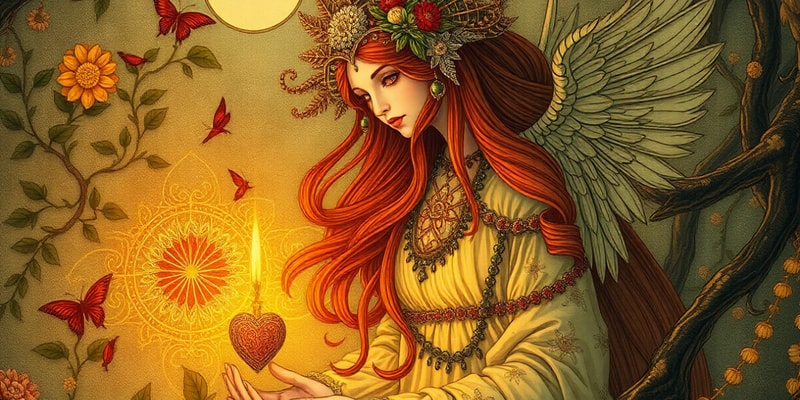Questions and Answers
What distinguishes a myth from a legend?
Which term is associated with fictional narratives set in any time and place?
What main aspect separates folk tales from myths?
What aspect of classical myths contributes to their perceived immortality?
Signup and view all the answers
What does the allegorical approach to mythology suggest?
Signup and view all the answers
In what significant way does classical mythology differ from folklore?
Signup and view all the answers
Which theory posits that myths are projections of our collective unconscious?
Signup and view all the answers
What concept did Sigmund Freud introduce that relates to familial relationships within myth?
Signup and view all the answers
What is the main idea behind the ritualist approach to mythology?
Signup and view all the answers
According to the theories of Max Müller, what do all myths describe?
Signup and view all the answers
What is the significance of the Late Bronze Age in relation to Mycenae?
Signup and view all the answers
Which of the following statements best describes the poetic contributions of Homer and Hesiod?
Signup and view all the answers
What characterizes Hesiod's Works and Days?
Signup and view all the answers
How did Panhellenism contribute to Greek cultural identity?
Signup and view all the answers
What was a notable characteristic of the Archaic Period in Greek history?
Signup and view all the answers
Which generation of gods does the castration of Ouranos by Kronos belong to?
Signup and view all the answers
What does Zeus's defeat of Typhoios symbolize?
Signup and view all the answers
What role do the Muses play according to the Hymn to them?
Signup and view all the answers
What is the interpretation of Chaos in the creation myth?
Signup and view all the answers
In Aristophanes' alternative creation myth, what is the role of Eros?
Signup and view all the answers
What is the term used to describe the 'sacred marriage' between earth-mother and sky-father in mythology?
Signup and view all the answers
Which pair is correctly associated with the descendants of the Titans?
Signup and view all the answers
Who castrated Uranus, leading to the birth of Aphrodite?
Signup and view all the answers
What advice did Rhea seek when she was pregnant with Zeus?
Signup and view all the answers
From what did Aphrodite originate?
Signup and view all the answers
What did Cronus do out of fear of prophecy?
Signup and view all the answers
What task did Rhea's attendants, the Curetes, perform for Zeus?
Signup and view all the answers
According to an alternate tradition, where was Zeus said to be born?
Signup and view all the answers
Study Notes
Classical Myths and Their Nature
- "Mythos" translates to "word" or "story"; myths can differ significantly in definition.
- Classical myths achieve immortality through timeless themes, beauty, and transformative power across generations.
- Myths differ from legends, which are rooted in recent history but remain secular, while folktales are fictional with both human and nonhuman characters.
Approaches to Understanding Myths
- Euhemerus (300 B.C.): Proposed that gods started as deified humans known for their extraordinary deeds.
- Allegorical interpretation views myths as metaphors for broader concepts; Max Müller suggested all myths reflect natural phenomena.
- Freud's theories linked myths to psychology, proposing concepts like the Oedipus complex and dream symbolism as narrative parallels.
- Jung viewed myths as manifestations of the collective unconscious, introducing archetypes representing universal human experiences.
Historical Context
- Myths originated from oral traditions, with significant contributions from figures like Homer and Hesiod, who recited foundational poems.
- The Late Bronze Age (1600-1150 BCE) was characterized by Mycenaean civilization, advanced social networks, and administrative records.
- The Iron Age (1150-700 BCE) reflected changes in society showcased by Hesiod's poetry, revealing specific obligations of agrarian life.
Archaic Period (750-490 BCE)
- Marked by population growth, colonization, and political changes, leading to a shared identity as "Hellenes."
- The concepts of Panhellenism illustrate the cultural unification of disparate Greek tribes, shaping a collective religious consciousness.
Theogony and Its Structure
- Hesiod’s Theogony consists of various oral traditions and elements that explore divine genealogies through hymns and narratives.
- The work establishes the origins of gods, emphasizing the chaotic beginnings and the orderly universe created by Zeus.
- Contains dramatic tales of divine conflict and transformation, with key events like Kronos's castration of Ouranos and the births of major deities.
Birth of the Cosmos and Deities
- The primordial elements include Chaos ("the yawning void") and Eros (Love), with differing interpretations of their significance in creation.
- Gaia, symbolizing Earth, gives birth to Uranus (Sky), establishing powerful mythic unions significant in various cultures.
- Descendants of Titans, such as Oceanus and Hyperion, are linked to major Olympian gods, highlighting their influence on Greek mythology.
Interpretative Themes and Motifs
- Discussions of male and female archetypes show tensions within mythic narratives, influenced by patriarchal societal structures.
- The myth of Uranus’s castration raises psychological interpretations regarding male dominance and reproductive fears, with Aphrodite's birth symbolizing beauty emerging from loss.
Key Figures and Events
- Cronus, fearing a prophecy, devours his children; Rhea's plan circumvents this with the secret birth of Zeus.
- Zeus's ventures and the overthrow of Cronus position him as a central figure in both mythological hierarchy and narrative structure.
Alternate Traditions
- The mythology surrounding Zeus includes varying accounts of his birthplace, indicating the richness and diversity of ancient Greek storytelling.
- Key events and characters serve not only to anchor the myths but also to reflect the societal values and beliefs of ancient Greek culture.
Studying That Suits You
Use AI to generate personalized quizzes and flashcards to suit your learning preferences.
Description
Test your understanding of the differences between myths, legends, and folk tales in this comprehensive quiz. Explore key aspects that separate these narratives and learn about the allegorical interpretations of classical mythology. Perfect for anyone interested in literature and cultural stories.




